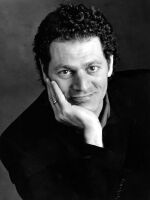Vladimir Horowitz, born 100 years ago today, was considered by music critics to be the greatest pianist of his time. Like magic, his fingers would fly over the keys, leaving audiences awestruck. On Morning Edition, music commentator Miles Hoffman talks with NPR's Bob Edwards about what made Horowitz such a great musician.
"When you talk about Vladimir Horowitz, these are the kinds of words that you do hear: You hear genius, you hear magic, you hear the god of the piano..." Hoffman says. "He set a standard for virtuosity. He set a standard for variations in tone color at the piano — what you could do with the sound of a piano."
Horowitz could sound like he was playing multiple pianos simultaneously. But, Hoffman says, he was "not just somebody who pounded the heck out of the piano. He was famous for the range of quiet sounds that he made."
To mark the Horowitz centennial, New York's Lincoln Center is holding a three-day film festival about the Ukrainian-born musician, who died in 1989 at the age of 86. And new Horowitz CDs are being issued, including an unedited recording of his 1965 comeback concert at Carnegie Hall after a 12-year hiatus from public performances.
Music Heard in the Morning Edition Report
1. Excerpts from three movements from "Pictures at an Exhibition" by Modest Mussorgsky, Horowitz: Mussorgsky/Tchaikovsky (RCA Victor, 60449-2-RG)
2. "Rondo alla turca," Mozart, Horowitz Encores (RCA Victor, 7755-2-RG)
3. "Ballade No. 1 in G Minor," Op. 23, Chopin, Horowitz, Live and Unedited. The Historic 1965 Carnegie Hall Return Concert (Sony Classical Legacy S2K 92023)
4. "Etude No. 11 in A-flat major," Op. 72, Moszowski. (Same CD as #3)
Copyright 2022 NPR. To see more, visit https://www.npr.org.


